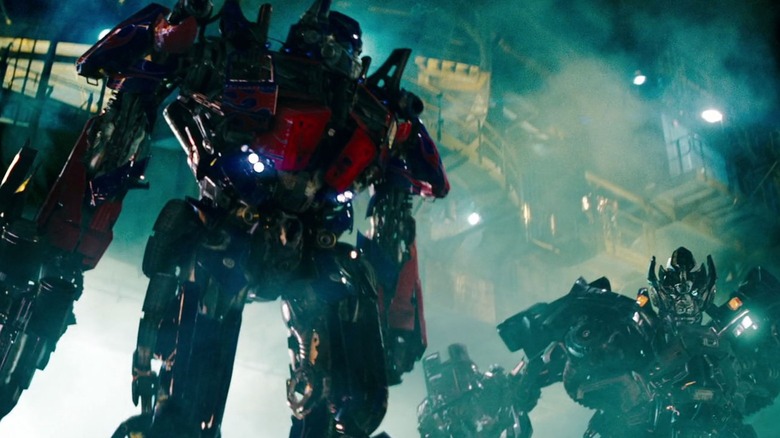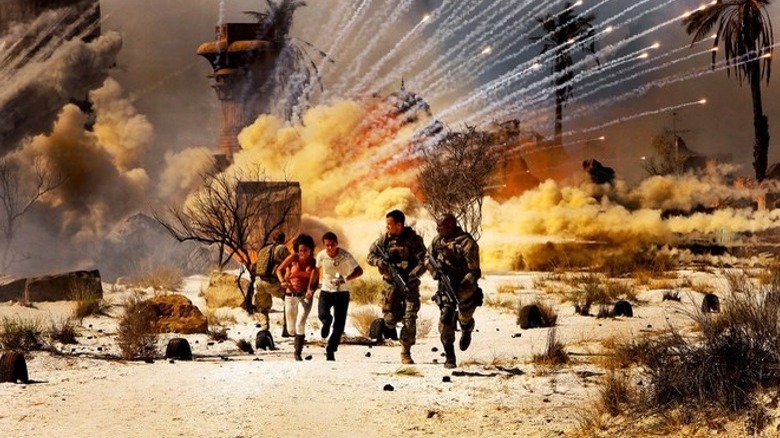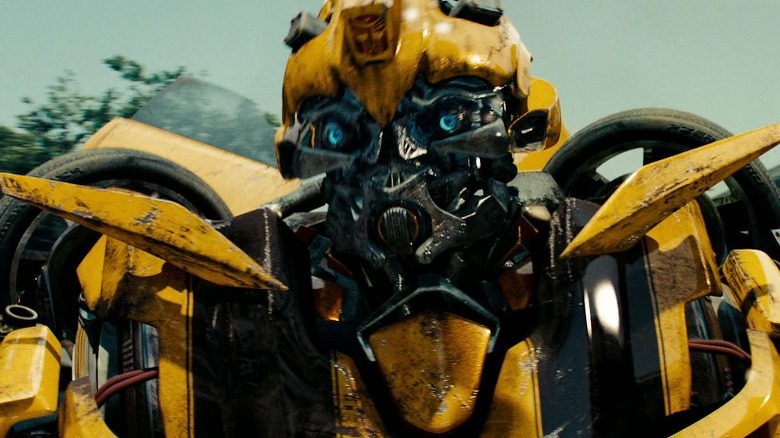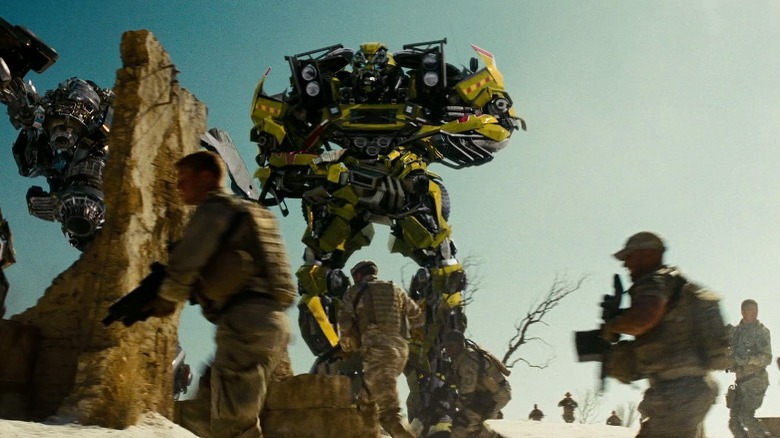Michael Bay Literally Locked Transformers' Writers In A Hotel To Finish Revenge Of The Fallen
While the live-action "Transformers" films directed by Michael Bay were largely financially successful (per BoxOfficeMojo), they rarely received approval from critics, who often cited the same issues: the broad comedy, the incomprehensible action, the messy and dysfunctional narratives. While Bay had to be talked into making the movies by producer Steven Spielberg, he certainly put his own stamp on them.
Even the most generous perception of the movies can't ignore how significant all of those issues are in 2009's "Transformers: Revenge of the Fallen." As the immediate sequel to 2007's groundbreaking and massive franchise starter "Transformers," "Revenge of the Fallen" had to ensure it was bigger at every turn. The movie would continue to follow the adventures of Sam Witwicky (Shia LaBeouf), the young human liaison to the Autobot aliens of Cybertron, as he enters college and finds his life threatened by the evil Decepticons yet again. As in the first movie, there is a fair bit of Cybertronian lore, but the plot of "Revenge" is mostly a springboard for unhinged Michael Bay setpieces.
Nevertheless, coming up with the screenplay for "Revenge of the Fallen" was somewhat complicated, and Bay was under immense pressure to put the film together. But an industry-wide issue promised delays. The script couldn't be completed on account of the 2007-2008 Writers Guild of America strike. When the strike began, Bay's writers had only been working on the movie for about two weeks, according to FirstShowing.net. When the strike was done, production wasn't far off on the horizon.
Because of that, Bay had little time to put his writers to work on the film. As the pressure mounted, he even went so far as to lock them in a hotel room until they had a finished script.
The fallen
The version of "Revenge of the Fallen" that was ultimately released certainly feels like its writers were locked in a hotel room during the scripting. Whether it's the "Gremlins"-esque little Decepticons who invade Sam Witwicky's home, the sitcom hijinks of Sam's parents (Kevin Dunn and Julie White), or the stabs at romance between Sam and first love Mikaela (Megan Fox, who would leave the franchise shortly after), the movie is a tonal mess, tied together only by Michael Bay's maverick camera moves and blocking.
The Autobots, after the events of the first movie, have formed an uneasy alliance with the U.S. military to stamp out further Decepticon activity on Earth. Leader Optimus Prime (Peter Cullen) defends the work against a favorite Michael Bay plot device, the unhelpful bureaucrat (John Benjamin Hickey), and Decepticon leader Megatron (Hugo Weaving) is resurrected. In short order, much of the status quo of the original film is brought back to bear, with a twist: the titular Fallen (Tony Todd), the original Decepticon who was exiled to Earth in 17,000 BC.
Trying to live a normal life, Sam is targeted by Decepticons, almost seduced by one disguised as a human named Alice (Isabel Lucas), and eventually by Megatron. Together with Mikaela and his new roommate Leo (Ramon Rodriguez), Sam goes on a global adventure that takes him to Egypt, as the carnage of the Transformers' war forms the backdrop and the bulk of the spectacle. Where the first movie had a propulsive conspiracy plotline and an endearing, if cynical, coming-of-age story taking precedence over the chaos, "Revenge" is a retread that often ends up as a caricature of what Michael Bay's biggest detractors accuse him of, complete with racial stereotypes and military recruitment advertising.
Working around the strike
The movie feels undisciplined as if the break in screenplay development gave way to Michael Bay's worst instincts. When you see the poster for Bay's 2004 film "Bad Boys II" in Sam and Leo's dorm, you yearn for that movie's relative restraint.
As co-writer Alex Kurtzman told FirstShowing.net, the filmmaker prepped the movie not based on a completed script, but "the outline" that came from just two weeks of work before the Writers Strike began on November 5, 2007. Bay was adamant about sticking to the deadline of June 26, 2009, and insisted on doing whatever work necessary to hit that mark, according to Variety.
During the next four months, as Kurtzman, his writing partner Roberto Orci, and their co-writer Ehren Kruger struck, Bay tinkered with the 20-page outline they had given him. While he didn't make any major changes to the outline, he did add gags and detail to the big setpieces, turning the outline into a 60-page "scriptment" that could be used for pre-production purposes. With Bay having a more complete idea of certain setpieces, pre-visualization work could begin, as well as concept art.
The Writers Strike didn't end until February 12, 2008. As Orci recalled, there were just "two months between starting to write and day one of direction." That was when Bay made the call to lock all three of the writers in hotel rooms until something satisfactory could be done with the "scriptment."
It might have resulted in one of the worst films of the series, but it did allow the movie to be released on time.
The barracks
Whether or not Michael Bay's efforts to get the script done in time for shooting worked out in the movie's favor, the work sounded intense. If Bay wanted to hit the June 2009 release date, he had to become a little dictatorial.
After the strike resolved, per the movie's Behind The Scenes featurette, Assistant Art Director Page Buckner developed a package of location photos (in Egypt, Wadi Rum, and Petra) as well as robot designs that Bay had wanted and sent them to the luxury hotel where Alex Kurtzman, Roberto Orci, and Ehren Kruger were stationed. This was to "immerse" them, but they were already working nonstop in the hotel for six weeks.
"You should've seen their room tab," Bay said in the featurette. Orci recalled how he and Kurtzman would close off their corner of the hotel room while Kruger worked in his own corner. All three writers worked night and day on the screenplay, often quietly until occasionally sharing their collective work with one another. The director was able to stop by at any time, in what Orci called "surprise inspections." That was why Bay had selected a hotel just a couple blocks from his office.
The end result of this intense labor was a movie that was widely derided and a script that represented the worst of Kurtzman and Orci's tendencies (complete with magical resurrections and an endless succession of MacGuffins like the "Sun Harvester") as well as Bay's. For star Shia LaBeouf, it felt as if the movie had "no script" at all, likely because of how flimsy the material was, to begin with.
But at least it hit the June 2009 release date.



